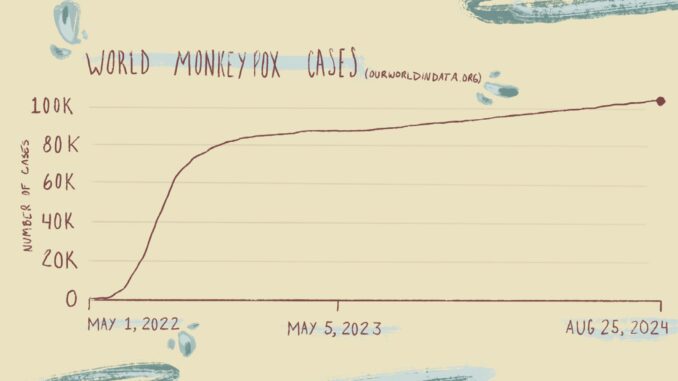
photo credit: Mackenna Miller
The next pandemic, the Covid-19 repeat: that’s what everyone is calling Monkeypox, but is it the next Covid-19?
Monkeypox, otherwise known as Mpox, is spreading faster than ever. Monkeypox first originated in the Democratic Republic of Congo in 1970[1] , according to the World Health Organization, but was relevantly quiet at that time. However, a global outbreak that occurred in 2022, is still occurring to this day and has become a global issue. According to the World Health Organization, 120 countries have reported mpox between Jan. 2022 and Aug. 2024, with more than 100,000 laboratory-confirmed cases reported and more than 220 deaths among confirmed cases.
From the Ohio Department of Health, the first case of mpox in Ohio was in 2022. As of now, there are 459 total cases in Ohio. Out of the 459 cases, there are 103 cases in Franklin County and 2 in Delaware County.
According to Clinic Aide Sherry Baltus, Mpox is a virus that is a zoonotic disease, which means it can spread between animals and humans. Some symptoms of mpox include fever, body aches, swollen lymph nodes and a rash of fluid-filled blisters.
Mpox is spread through direct contact with the infected animal or human or direct contact with contaminated material such as bedding; this is a contrast from COVID-19, which was air-borne.
“I don’t think we will be on lockdown again. This isn’t a new disease like Covid was, and there are vaccines for it already,” Baltus said.
Still, the fear of a new lockdown is spreading through social media platforms, as in the case of sophomore Shresthi Senthil, who heard about mpox through social media and her friends.
Both Senthil and Baltus said another lockdown would affect their work life. For Senthil, it would disrupt her junior and potentially her senior year, which is the year she looks forward to the most. Despite this, Senthil still found things to enjoy during the last lockdown.
“One good was having a lot of free time to discover new hobbies,” Senthil said. Despite having limited social contact, she managed to find new hobbies to occupy her time.
Baltus also said she has faith in Americans’ ability to hypothetically overcome another pandemic. “It would be exhausting! Ha! But we managed to get through a pandemic before, and we could do it again. Plus, we know so much more now!”
While there were some good things gained from the last lockdown, everyone should work on preventing the new lockdown by paying attention to symptoms and prevention. Some practices that help prevent catching mpox, according to Baltus, are washing hands, avoiding skin-to-skin contact with humans or animals that have a rash or pox, and getting vaccinated.
While this is less like COVID-19 and harder to catch, people must still practice healthy hygiene to prevent others from getting it, using tips from Baltus and the World Health Organization.


